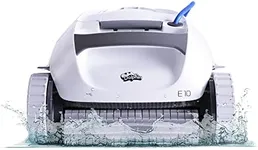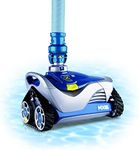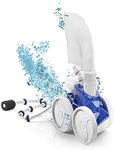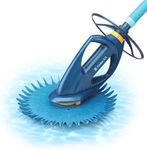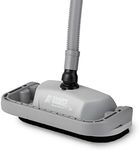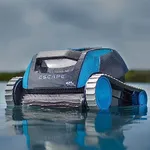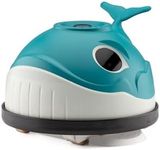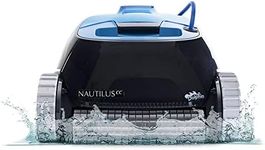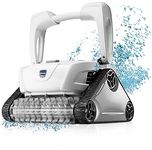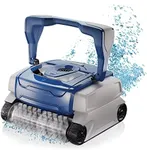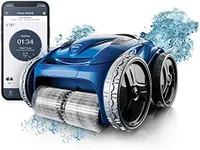Buying Guide for the Best Ground Pool Cleaners
Choosing the right ground pool cleaner can make maintaining your pool much easier and more efficient. The right cleaner will help keep your pool free of debris, algae, and other contaminants, ensuring that the water remains clean and safe for swimming. When selecting a ground pool cleaner, it's important to consider several key specifications to ensure you get the best fit for your pool's size, shape, and your cleaning needs.Type of CleanerGround pool cleaners come in three main types: suction-side, pressure-side, and robotic. Suction-side cleaners attach to your pool's filtration system and use the suction to move around and clean. Pressure-side cleaners use water pressure from a dedicated pump to move and collect debris. Robotic cleaners are self-contained units that operate independently of your pool's filtration system. The type of cleaner you choose will depend on your pool's specific needs and your preference for convenience and maintenance.
Pool Size and ShapeThe size and shape of your pool will influence the type and power of the cleaner you need. Larger pools or those with irregular shapes may require more powerful or sophisticated cleaners to ensure thorough cleaning. When choosing a cleaner, consider the cleaner's ability to navigate and clean the entire pool, including corners and steps. For smaller or standard-shaped pools, a basic model may suffice, while larger or uniquely shaped pools may benefit from a more advanced cleaner.
Cleaning CoverageCleaning coverage refers to the areas of the pool that the cleaner can effectively clean, such as the floor, walls, and waterline. Some cleaners are designed to clean only the pool floor, while others can handle walls and the waterline as well. If you want a comprehensive clean, look for a cleaner that offers full coverage. Consider your pool's specific cleaning needs and choose a cleaner that can address all areas you want to keep clean.
Debris HandlingDifferent pool cleaners are designed to handle different types and sizes of debris. Some are better suited for fine particles like sand and silt, while others can handle larger debris like leaves and twigs. Think about the type of debris that typically ends up in your pool and choose a cleaner that can effectively manage it. If your pool is surrounded by trees, for example, you may need a cleaner with a larger debris capacity.
Ease of Use and MaintenanceConsider how easy the cleaner is to set up, operate, and maintain. Some cleaners require more manual intervention, such as emptying debris bags or adjusting settings, while others are more automated and user-friendly. If you prefer a low-maintenance option, look for a cleaner with features like self-cleaning brushes or easy-to-empty debris containers. Your comfort level with pool maintenance will help guide you to the right choice.
Energy EfficiencyEnergy efficiency is an important consideration, especially if you plan to run your pool cleaner frequently. Robotic cleaners are generally more energy-efficient than suction-side or pressure-side cleaners because they operate independently of the pool's filtration system. Look for cleaners with energy-saving features or those that are designed to use less power. An energy-efficient cleaner can help reduce your overall pool maintenance costs.
Durability and WarrantyThe durability of the pool cleaner and the warranty offered by the manufacturer are important factors to consider. A durable cleaner made from high-quality materials will last longer and provide better value over time. Check the warranty terms to understand what is covered and for how long. A good warranty can provide peace of mind and protect your investment in case of defects or issues with the cleaner.

